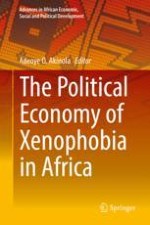2018 | OriginalPaper | Buchkapitel
11. The Xenophobia-Coloniality Nexus: Zimbabwe’s Experience
verfasst von : Everisto Benyera
Erschienen in: The Political Economy of Xenophobia in Africa
Aktivieren Sie unsere intelligente Suche, um passende Fachinhalte oder Patente zu finden.
Wählen Sie Textabschnitte aus um mit Künstlicher Intelligenz passenden Patente zu finden. powered by
Markieren Sie Textabschnitte, um KI-gestützt weitere passende Inhalte zu finden. powered by
